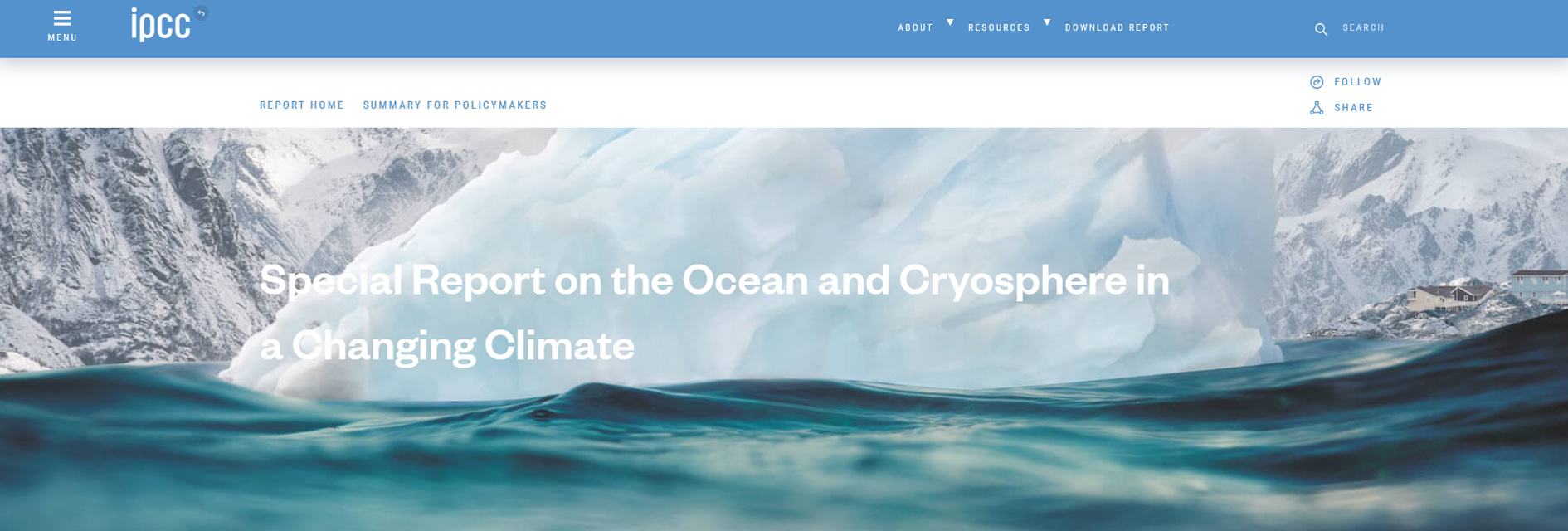The IPCC approved and accepted Special Report on the Ocean and Cryosphere in a Changing Climate at its 51st Session held on 20 – 23 September 2019. The Report highlights the urgency of prioritizing timely, ambitious and coordinated action to address unprecedented and enduring changes in the ocean and cryosphere. The report reveals the benefits of ambitious and effective adaptation for sustainable development and, conversely, the escalating costs and risks of delayed action.
More than 100 authors from 36 countries assessed the latest scientific literature related to the ocean and cryosphere in a changing climate for the report, referencing about 7,000 scientific publications.
Melting ice, rising seas
Glaciers and ice sheets in polar and mountain regions are losing mass, contributing to an increasing rate of sea level rise, together with expansion of the warmer ocean.
While sea level has risen globally by around 15 cm during the 20th century, it is currently rising more than twice as fast – 3.6 mm per year – and accelerating, the report showed.
Sea level will continue to rise for centuries. It could reach around 30-60 cm by 2100 even if greenhouse gas emissions are sharply reduced and global warming is limited to well below 2°C, but around 60-110 cm if greenhouse gas emissions continue to increase strongly.
More frequent extreme sea level events
Sea level rise will increase the frequency of extreme sea level events, which occur for example during high tides and intense storms. Indications are that with any degree of additional warming, events that occurred once per century in the past will occur every year by mid-century in many regions, increasing risks for many low-lying coastal cities and small islands.
Without major investments in adaptation, they would be exposed to escalating flood risks, the report shows. Some island nations are likely to become uninhabitable due to climate-related ocean and cryosphere change, the report said, but habitability thresholds remain extremely difficult to assess.
Changing ocean ecosystems
Warming and changes in ocean chemistry are already disrupting species throughout the ocean food web, with impacts on marine ecosystems and people that depend on them, the report said.
Knowledge for urgent action
The report finds that strongly reducing greenhouse gas emissions, protecting and restoring ecosystems, and carefully managing the use of natural resources would make it possible to preserve the ocean and cryosphere as a source of opportunities that support adaptation to future changes, limit risks to livelihoods and offer multiple additional societal benefits.
Coastal cities, especially megacities with over 10 million inhabitants, are at serious risk from climate-related ocean changes. Over half of today’s global population lives in cities and megacities, many of which are located in Low-Lying Islands and Coasts (LLIC), including New York City, Tokyo, Jakarta, Mumbai, Shanghai, Lagos and Cairo. Without substantial adaptation interventions, and based on the compounding effects of future growth in population and assets, sea level rise and continued subsidence, future flood losses in coastal cities are projected to rise. In addition to important impacts on coastal megacities and large port cities, small and mid-sized cities are also considered highly vulnerable because of fast growth rates and low political, human and financial capacities for risk reduction compared to larger cities.
At a more local scale, and regardless of the size of the city, coastal property values and development will be affected by sea level changes, storms and other weather and climate-related hazards. Real estate values, and the cost and availability of insurance, will be impacted by actual and perceived flood risks. Properties are also at risk of losing value due to coastal landscape degradation.
Download full Report here!

